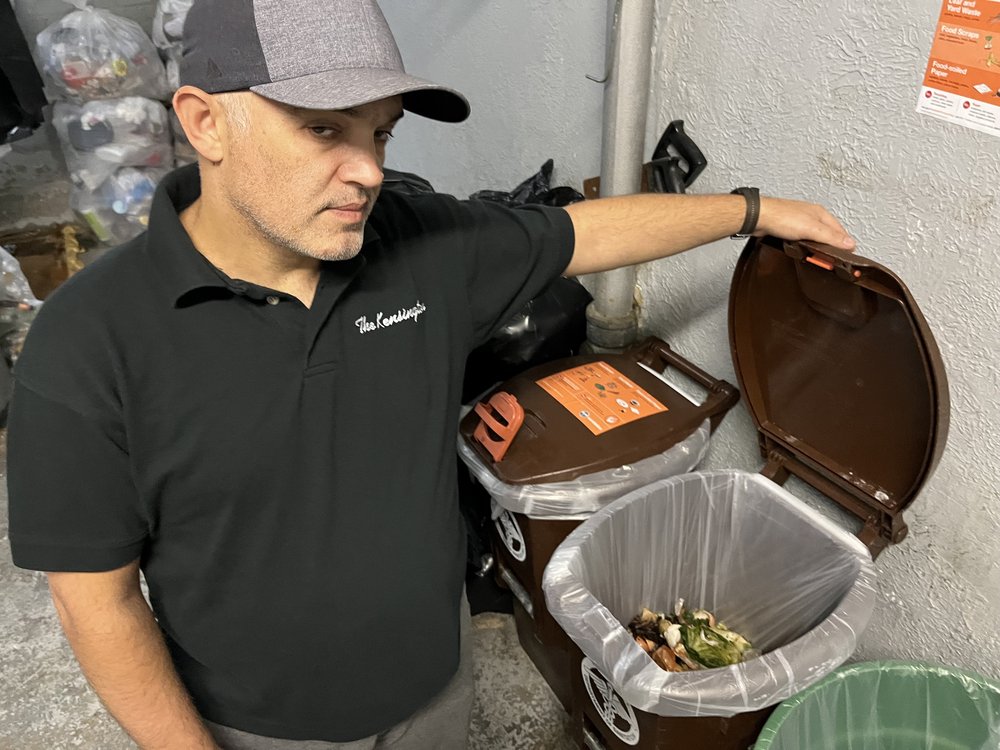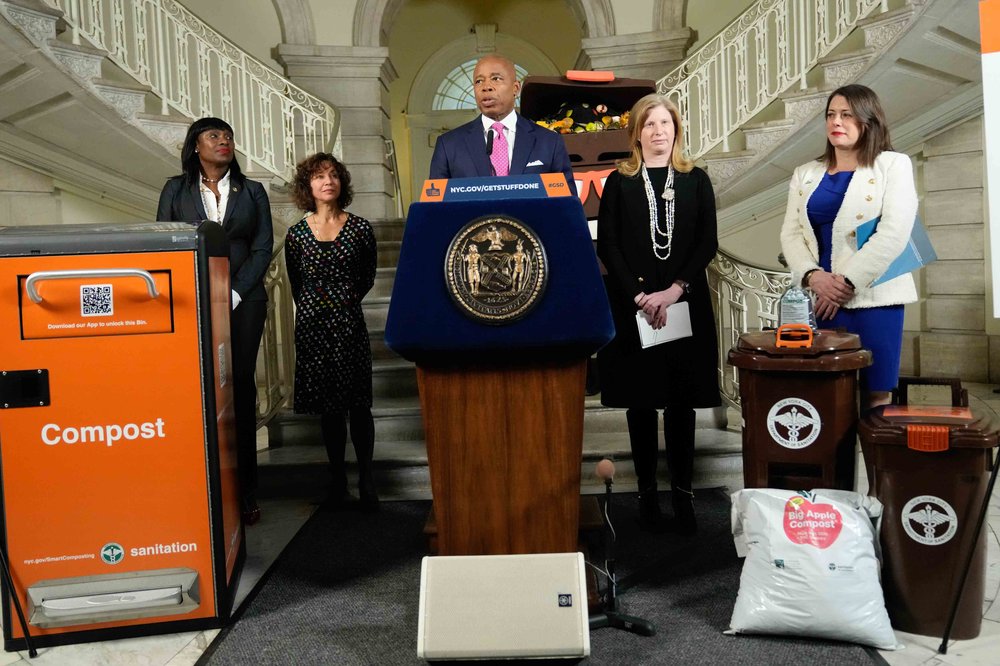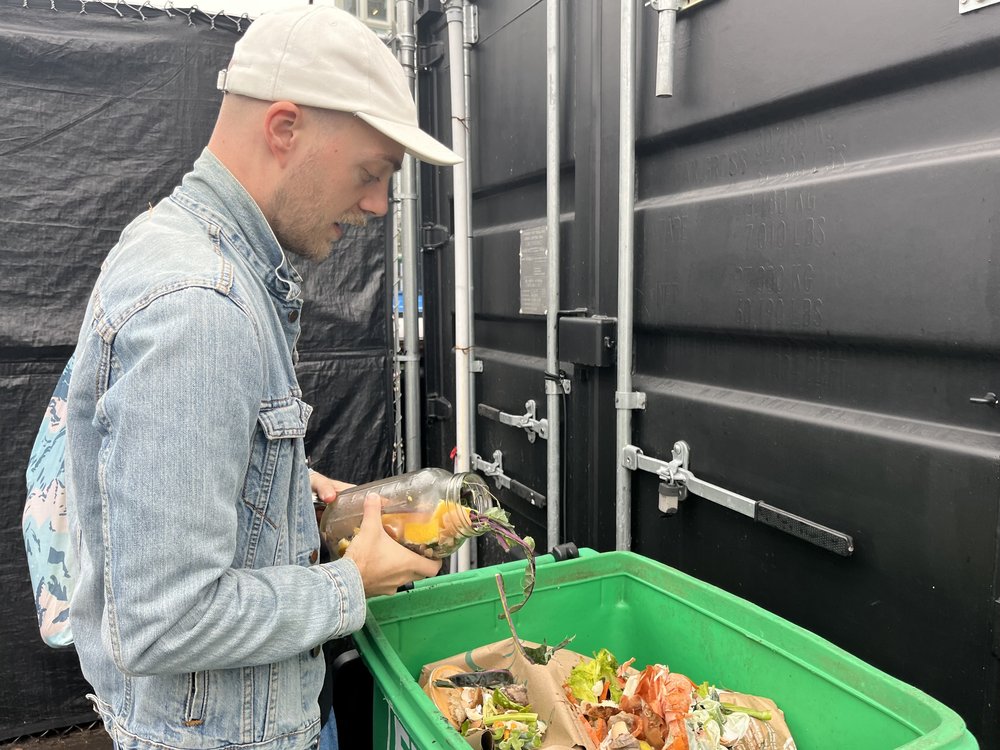Universal composting in NYC? Not so fast, say some Queens and Brooklyn landlords.
Nov. 2, 2023, 3:51 p.m.
Some residents of large apartment buildings in Queens and Brooklyn say their landlords or superintendents are reluctant to embrace the program.

Kensington super Bylent Abazi shows off the composting setup at his building. He acknowledged some of his peers are reluctant to take on added responsibilities.
Mayor Eric Adams has hailed the new universal curbside compost collection program in Brooklyn and Queens as an “automatic, guaranteed, free, year-round service.” But some tenants in large apartment buildings say their landlords or superintendents have yet to embrace the effort to reduce organic waste in landfills.
Tenants in Williamsburg, Kensington and Astoria detailed a broad range of experiences with composting. Some tenants said the landlords of their large buildings had outright refused to adjust how garbage is handled. Some landlords were concerned that compost would attract Adams’ most hated enemy: rats. Other apartment buildings, meanwhile, had implemented a compost system within weeks.
“We’ve talked to our landlord, and he just was like, ‘Absolutely not, it’s too much of a hassle and a pain,’” said Kelley Davies as she emptied several freezer bags of compost into a community collection bin at Domino Park in Williamsburg this week.
Her neighbors would probably compost more if her 30-unit building had a setup, she said.

Last year, Queens became the first borough to receive compost collection. The service expanded to all of Brooklyn last month. The Bronx, Staten Island and Manhattan are slated to receive the service next year.
Landlords and building superintendents can’t currently be compelled to participate in the voluntary program. The city isn't issuing fines until 2025, when the program is in effect citywide. Fines will start at $25 for apartment buildings with fewer than nine units, and $100 for larger apartment complexes.
The Bronx, Staten Island and Manhattan are slated to receive the service next year.
For now, sanitation department spokesperson Joshua Goodman said the agency is issuing warnings to landlords in Brooklyn and Queens who are not separating compost for pickup. There is a mandate, however, to compost yard waste in Brooklyn and Queens.
“This is a long-term process of culture change in the city and within our buildings,” Clare Miflin, the executive director of the Center for Zero Waste Design, said during an Oct. 13 meeting of Brooklyn’s Solid Waste Advisory Board.
One large 102-unit coop building in Kensington has embraced composting. The building’s super, Bylent Abazi, makes sure eight compost bins in the trash room don’t overflow and wheels them out on collection days with other trash and recycling. He acknowledged that composting creates extra work for building staff.
“They're … making hardly the minimum wage and you add more stuff on their plate, and they get tired of it,” Abazi said. “They’re just not going to try to push it to the landlord or say ‘this is going to work,’ because they just don't care – because you're making more work for them.”
Sarah Woodruff, a project manager at the sustainability nonprofit Big Reuse, called composting in large buildings “a whole different ball game” at the BkSwab event.
“There’s a lot of reluctance sometimes around, ‘Is it more work?’” Woodruff said, suggesting tenants advocate to building management and volunteer to take the bins to curbs. “It’s the same amount of material, you’re just putting it in a different bin.”
A spokesperson for SEIU 32BJ, which represents apartment building workers, said the union has offered training courses to help members comply with composting rules.
The courses teach “best practices and strategies our members can implement in their buildings to help smooth the transition and address tenant concerns, which we learned was mainly bad odors and pests,” said John Santos, the union’s secretary-treasurer, in a statement.
Jacob Rosse, who was also dropping compost off at Domino Park, said the landlord of his 28-unit building was “concerned about rats.”

Residential buildings can use their own containers for compost collection. Goodman said 43,997 official brown bins were ordered in Queens and 61,243 bins were ordered in Brooklyn, and added that the number of orders suggests enthusiasm for the program.
“The substantially higher Brooklyn number is interesting given that many Brooklyn residents already had bins from prior programs, whereas Queens residents did not. This really speaks to the popularity of the program and to our outreach efforts,” Goodman said in a statement.
Councilmember Sandy Nurse said that the sanitation department needs to keep educating building management and landlords about their responsibilities.
“The department needs to do extensive outreach and engagement ongoing, because one time is not going to be enough, and to get as many buildings as possible,” said Nurse, who chairs the Council’s sanitation committee and spearheaded the mandatory composting legislation.
Eric Schwartzman, a resident of Queens, which was the first borough to receive curbside compost collection, said it took about a month before his 20-unit building in Astoria actually set up the bins.
“We have a garbage area where we have one of the brown bins that everybody uses,” Schwartzman said. “When it was finally distributed to the buildings, I think we started using it.”
NYC's compost collection program expands to Brooklyn